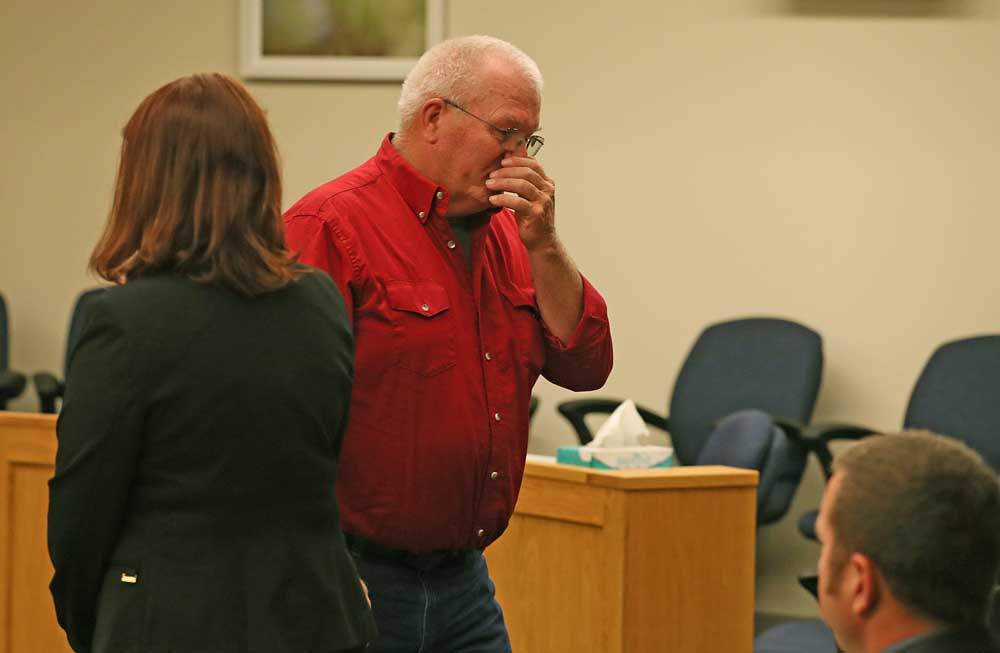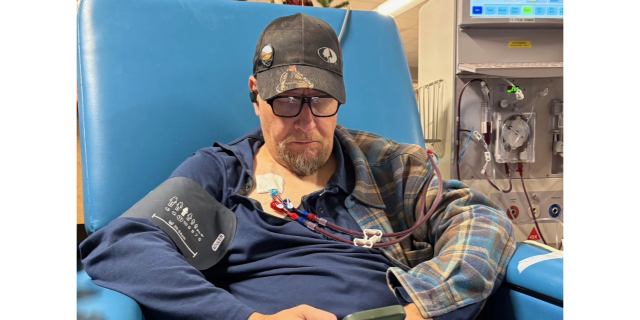Wilkins convicted, gets double life sentence for 2019 Shady Cove double-murder
Published 6:45 pm Thursday, June 15, 2023

- Clyde Gann breaks down after speaking during the murder trial of Kit Warren Wilkins, who was convicted of murdering his daughter Judy Gann and her mother Shirley Gann.
Convicted murderer Kit Warren Wilkins won’t be eligible for parole until he’s 123 years old.
Wilkins learned his fate Thursday after a jury in Jackson County found him guilty of murdering his longtime girlfriend and her daughter at the Shady Cove home they all shared in 2019.
Wilkins, 63, will serve two consecutive 30-years-to-life sentences for killing his girlfriend, Shirley Kay Gann, 62, and her daughter, Judy Mae Gann, 43. He won’t be eligible for parole for 60 years.
Circuit Court Judge Laura Cromwell read the verdict late Thursday afternoon after the jury had deliberated for less than two hours. She then sentenced Wilkins after he requested it — and when she did, she did not mince words.
“I still feel, Mr. Wilkins, that I don’t think you even realize to this day the magnitude of what you did,” Cromwell said. “I don’t think you have any empathy whatsoever, and it’s heartbreaking.”
Prosecutors argued Wilkins had told family and friends of the Ganns that he held a grudge and wanted to harm them. The day before the murders, when Shirley and Judy left the home to run an errand, Wilkins told another man who lived on the property that he had “something” for them when they returned — meaning his gun. The exchange left the man, Justin Wncuck, so disturbed he called his mother and asked her to take him home.
Wilkins texted Shirley that day demanding she move out of the home they shared on Sarma Drive, while also complaining he was eating by himself the barbecue chicken dinner he had prepared because she had “forsaken me.”
Shirley was found with multiple gunshot wounds inside the house, while Judy was found facedown on the porch. Seven bullets had been fired into the women.
Speaking in an even-keeled voice, Wilkins called 911 the morning of April 21, 2019, and reported their deaths, adding that he might be “liable.” He also used the call, which jurors heard, to rant about things unrelated to the women’s deaths.
Wilkins was talkative with law enforcement at the crime scene, but directed his ire at Shirley and Judy once he sat down with detectives at the Jackson County Sheriff’s Office.
The exchange led Cromwell to compare the Wilkins case to others she has seen in her career.
“I’ve never seen, in my career, an interview, or behavior after the fact, that was so callous,” Cromwell said. “You are filled with hate — and you are filled with hate for a number of people, especially women. It’s disgusting, quite frankly. I think you deserve everything you’re going to get.”
She said Wilkins would use “any drug you could possibly get your hands on,” alluding to his defense counsel’s argument that he could not have formed the intent to murder because of a life of drug use, which was punctuated by an on-the-job injury two decades ago.
“You choose to deal with your own issues, and you have decided to hide under a haze of smoke and any other drug you can possible get your hands on,” Cromwell said.
But she did not understand Wilkins’ reasoning that he should be shown sympathy by a jury based on his mental health history, which started with ADHD, but grew into personality disorders later in life.
“All these personality disorders — and experts agree you have a plethora of them — you’re not born with those. Those come by reinforcing bad behaviors day in and day out,” Cromwell said. “You think you’re a victim in this war. … That is on you; you are not born with that.”
The judge predicted Wilkins would go on to reinforce his bad behavior in prison.
“Quite frankly, you’re probably going to die alone and miserable,” Cromwell said.
She added that she wished she had more time to think about what she wanted to say during sentencing, but used the moment to acknowledge the pain of the victims’ family.
Deputy District Attorney Melissa LaRitz introduced them, saying the murders of Shirley and Judy have changed the family’s entire life.
Several members of Judy’s family spoke by phone, including Jesika Kahn, her daughter.
“April of 2019 was when my world stopped,” Jesika said. “For the last four years, I’ve been angry. I’ve been hurt and sad. There’s a lot of moments I can remember. Trauma does that to you.”
She added she did not believe Wilkins would ever tell anyone why he killed Shirley and Judy Gann.
“I have to learn how to live with that,” Jesika said. “I’ll be careful with my words here, but you are a terrible excuse of a human being.”
Jesika added, “I’m choosing to move on.”
Another one of Judy’s daughters, Shayla Kahn, was overcome with emotion speaking over the phone.
“It feels like, everyday, when you finally get to a point where you feel like the grieving might be over, there’s something new that happens,” Shayla said. “This has been going on for four years now.”
At one point during the teleconference remarks, Wilkins attempted to take notes, but his attorney Wm. David Falls, quietly advised him not to do that.
Judy’s father, Clyde Gann, was the only family member who spoke to the court in person.
“Deep down in my heart, I do forgive you,” Gann said. “But God will never forgive you.”
When Wilkins was given a chance to speak, he initially did not respond. When Cromwell asked again, he responded “no,” he did not want to make remarks.
Wilkins also simply said, “Thank you,” once Cromwell finished her scathing statement about his crimes.
The remark was enough to make jury foreperson Kathy Stalker believe the sentence Cromwell handed down was the right one.
“Given the communications from Judy’s daughters and the family, and also hearing the response from Mr. Wilkins, (the sentence) was justified with the verdict we came to,” Stalker said in an interview after the sentencing. “With this case, (deliberations) did not take long. Due to all of the evidence that came forth, it was a very easy decision for all of us.”
She added the jurors came in with an “open mind” about the Wilkins case, but in the end it was “completely unanimous.”
“I would say the defense team did what they could, but when it comes down to it, facts are facts; evidence is evidence,” Stalker said. “There was no denying where the truth was, and we had no reasonable doubt of it. In the end, I do believe that we chose the right verdict, and we brought justice for the family, Judy and Shirley.”





